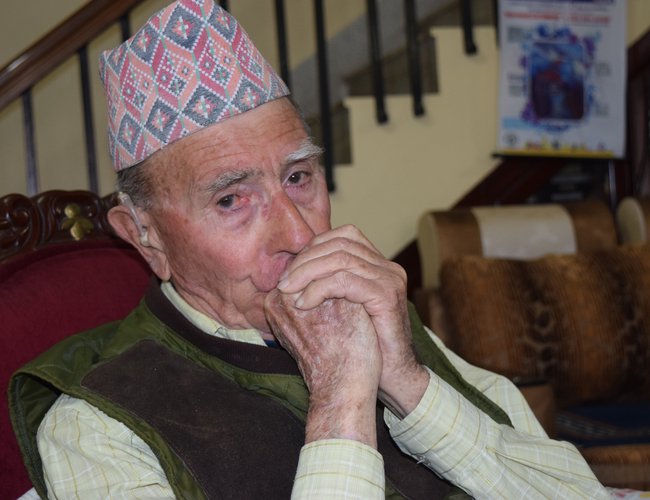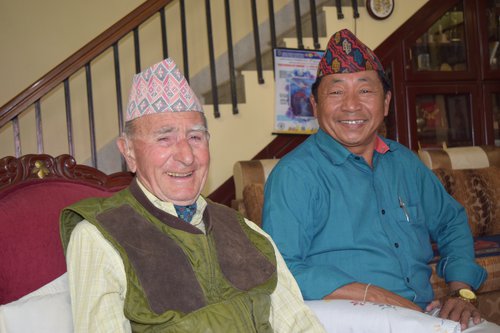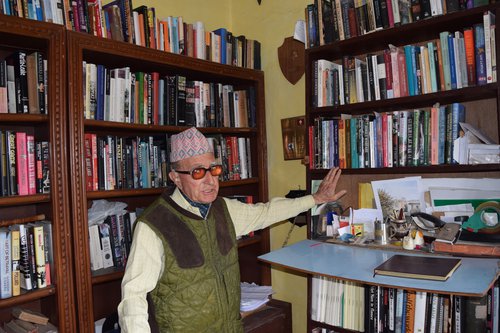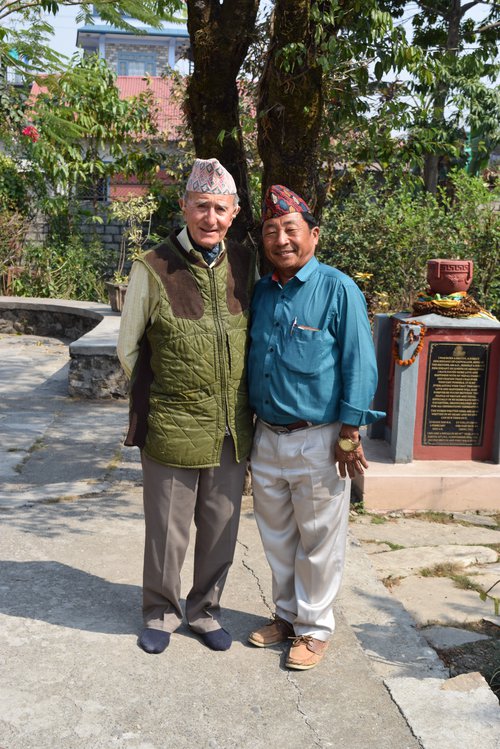
When someone calls JP Cross on his phone, he responds with a “hajur” in a perfect Nepali with some western accent. “Ma karenel JP Cross boldai chhu, tapaile kaslai khojnu bhakyeko (Yes, this is colonel JP Cross speaking, who are you looking for?).
A British Nepali language perfection leaves many people puzzled. One can rarely distinguish him if he is a Nepali born British or British born Nepali.
Living in an extended family of surrogate son Buddhiman Gurung in Pokhara near Taxi Chowk, JP Cross has not changed much physically. Although Buddhiman Gurung is his adopted son, their love and affection towards each other is exemplary.
Wherever Cross visits, Buddhiman Gurung takes care him as a son, secretary, friend and everything. Cross saw three grand children growing. One of the granddaughters is currently a medical doctor at Palpa Mission Hospital and another is studying bachelors in Hotel Management in Pokhara and a grandson is in the British Army.
Father and Son
Since he met Buddhiman Gurung twenty seven years ago, they have remained together as inseparable. In memory of their beginning together, 25 years later, a stone sculpture was religiously dedicated and it is in their garden.
“Baba (JP Cross) is the backbone of the family. He advises and guides us,” said Buddhiman Gurung. “We visited my daughter in Palpa Mission Hospital, where she is a physician. We spent time on the back from Amlekhgunj Army Warfare College. When they met, the Grand Daughter and Grandpa were both happy.”
“Grandchildren always enjoy being with Baba (JP
Cross). He is our mentor and guardian, who guides us and encourages us to be a
good citizen of this country,” said Gurung. “This shows our family affection.”
The word written in the memorial is a testimony of their long-term relations. JP Cross writes:
I was born of a Briton, a direct descendent of Cadallon, King of Britons 656 AD, himself a direct descendant of Joseph of Arimathea. I have found more love and happiness with my Nepali family and friends than I had ever thought possible. It is my everlasting wish that that this same love and happiness will also forever be found between the people of Britain and Nepal, especially my surrogate sons, daughters, grandchildren and for all generations thereafter.
The words written here are also written in my heart and no one can rob them out. 6 February 2003.
I became a Nepali in my 90 th year, on 14 November 2014.The second Briton and first male ever.
JP Cross’s love and affection as well as Buddhiman’s family affection to him are reflected everywhere. JP Cross has even written a book dedicated to Buddhiman’s family clan. Buddhiman’s family, which is originally from Lamjung, provided a stone for throne to Shaha dynasty.
“Buddhiman and I had been uterine brothers, not son and father, living farther to the East, as Christian, low caste sweepers, both very good men. My mind raced; to the East lay Kathmandu and, up to 1768, six Capuchin monks has been there for over a century. We were separated and simply had to meet in this incarnation, but as a son and father. If we are both pure in this life, not only will my only perceived task, writing, be successful but we will be uterine brothers once more in our next incarnation,” writes Cross in his book Call From Nepal, published in 1996 explaining his relations.
Nepali Citizenship
Although his mind and soul are with Nepal and Nepali, he was officially given the citizenship of Nepal in 2014. On 14 November 2014, I became second –ever Brit to become a Nepalese citizen, after a wait of thirty-two years, the equivalent time a new recruit takes to earn his Gurkha major’s pension.
Although he was born and grew in England, ninety-three years old JP Cross, a retired colonel of British Army, has almost seven and half decades long association with Nepali or Gurkha.
Daily Chorus
As a disciplined retired army colonel, JP Cross follows a very strict and routine life. He starts his day with a morning walk, looking at the beautiful Himalayas, north of the house, takes a bit of a hike and also goes for the golf course.
The daily chorus of JP Cross starts at early in the morning. He wakes up at 6 and starts his morning walk with his son Buddha Gurung at 7:30 and this lasts for almost four to five hours.
He also engages in different social, religious, cultural and recreational activities like sports. On many occasions, local schools invite him to chair various programs and request him to give his remarks.
As a retired Gurkha Army colonel, he also attends programs organized by Indian Army, British Gurkha and Nepal Army. The Colonel also regularly attends the orientation programs organized for newly recruited British Gurkha.
Having a long experience in jungle warfare, he has also been giving classes in Nepal Army’s jungle warfare school. A few weeks back, he was in Nepal Army’s Jungle Warfare School in Amlekhgunj.
With a well-managed collection of books at his library, he also spends a certain period of time in study and writing. Having published almost twenty books on Gurkha and Nepal, JP Cross still wants to publish story books to bring Nepal into global limelight.
JP Cross’s social bonding with the local people and Nepalese is very strong and people respect him as a guardian, elderly person, scholar and so on. Living in the house of a surrogate son and his family, JP Cross also visits his grand children.
 “During more than seventy years I have been with
them, I have come to know many more Nepalis better than I have people from the
land of my birth, that is England. I can see a problem both as an Englishman
can and as a Nepali can – a recipe for never having a duodenal ulcer from worry
as well as for constant indecision! I
have come to the conclusion that it is not so much what we are others are that
causes difficulties in society but what we and others think we are that does. I
can also see Nepal in a way that, maybe, Nepali cannot: phrase such as ‘wood
for the trees,” writes JP Cross.
“During more than seventy years I have been with
them, I have come to know many more Nepalis better than I have people from the
land of my birth, that is England. I can see a problem both as an Englishman
can and as a Nepali can – a recipe for never having a duodenal ulcer from worry
as well as for constant indecision! I
have come to the conclusion that it is not so much what we are others are that
causes difficulties in society but what we and others think we are that does. I
can also see Nepal in a way that, maybe, Nepali cannot: phrase such as ‘wood
for the trees,” writes JP Cross.
As he speaks humbly with everyone and responds everyone’s call, JP Cross is smiling and greeting everyone on his way.
Having just one meal a day, JP Cross spends his time in his study room, which has a collection of large volumes of books and collections of arts and artifacts.
With Buddhiman, they do maintain a good collection of arts, pictures and Khukuris and other many gifts JP Cross collected from around the world.
“Language may also play a part: although I did not start learning until I was of 20 years, no Nepali takes me for a foreigner on hearing me speak. Likewise religion: I have been invited to become honorary Hindu and an honorary Buddhist- and accepted both. But, even before that, there was something other than people wanted from me: occasionally first-time pregnant mother wants blessing so that their first-born be a son; lads to be successful recruits for the British Army; and countless students from passing exams. My success rate is astonishingly high,” said Colonel JP Cross.
He received his citizenship just three years ago after a struggle, his love, faith and loyalty towards Nepal remains constant. He always loves Nepal from his inner heart and mind.
“Since 1985, I have been allowed to settle in Nepal where I feel I belong. I am one of the most privileged foreigners ever to be allowed to lead my life with such wonderful people and I pray, to whichever of the many gods that is nearest to me, that I may continue to live among them till the end of my days. The call of Nepal is still as loud as it ever was when I first heard so many years ago,” said JP Cross.
“The chemistry of empathy and love between me and the Gurkhas, the traditional martial stock of Nepal, started very early on. I got the best out of them and them of me, so I never had to soldier on my men. As regards my brother officers and superiors, I was a puzzle.”
“When pressed for details, I have to be more septic. It was not only a physical context that I found myself away from England and in many countries in Asia other than Nepal. It was also a mental, emotional, spiritual and profoundly personal journey I found I was undertaking, often feeling incomplete, but looking for quite I knew not what, one which took me to peoples’ mind and hearts in those countries. I manage both to get peoples’ mind and hearts in those countries. I managed both to get nine Asian languages under my belt and name for eccentricity among my own countrymen; many Asians I came into close contact with over the years saw me as different from other Europeans and this resulted in a closer empathy with me than with other Europeans.”
Citizenship Process
Although he spent a long time to secure the Nepali citizenship, he rarely showed any nervousness. One of his research fellows of CNAS Bhim Rawal became home minister in 2010; it did not make any difference to his status. His application file moved from here to there.
Fulfilling all the criteria and conditions required to acquire the Nepali citizenship, including giving up his British citizenship, graduation in Nepali, living over 20 years in the country, Nepal’s Home Ministry declined to issue him citizenship. In one case, District Administrative Office of Kaski reported him that his file was misplaced and asked him to present another one.
“One personal change to me has been the granting of Nepalese citizenship, a process that took thirty-two-years, six months and two days. I am only the second English Nepali. The first Briton to receive Nepali citizenship was English lady Ms Eileen Lodge, who founded the leprosarium, Green Pasture not far from my house. Since then granting of citizenship for some types of Nepalis as well as for foreigners has become exquisitely harder. Since becoming a Nepali, however, in spite of the staggering amount of joy and happiness shown even by those with whom I had never previously spoken, no more stories have eventuated.
I believe on Rudyard Kipling’s words about not trying to hurry the East stood me in good stead and patient was rewarded. On 14 November 2014, five months before the 200th anniversary celebrations, I was given my Nepalese Citizenship, the second Briton over.
“Nepalese can be as vicious as they are normally charming. They are seldom wantonly cruel, often wantonly thoughtless, and, as in any organization anywhere, a problem is much easier to deal with if it does not exist,” writes JP Cross in his book The Call of Nepal.
Regards to Late King Birendra
Immediately, after retiring on pension in 1982, I’d been asked to serve as a researcher in the Tribhuwan University in Kathmandu. I had not had a home posting since leaving England on 8 June 1944; thirty–eight years previously so my surrogate son, Buddhiman Gurung, and his wife became my lodestones for survival if I were to become blind, meaning I had to continue to live in Nepal.
In 1984, King Birendra had given me permanent residential status with the privilege of being a house and land owner- the only foreigner in the history of the country. But ever to be so honored.
Although he grew up in an English family where birthdays matter very much, he has seen rarely anyone coming to ask him about his birthday. “Birthdays are not traditionally observed by the hill folk- most not knowing when appointed days fall- and have told my surrogate family not to bother about any of mine till I am 100!! Even at 92, I have had to wear tunnel vision spectacles for more than one –third of my life. I have also lived with civilian Nepalis and military Gurkhas for more than seventy years, slightly more than one-third of our combined military life.”
Encyclopedia of Gurkha
JP Cross is an encyclopedia of British Gurkha. Having served for such a long period of time, he understands Gurkha’s behavior correctly. In the words of Sir Hew Strachan, professor of International Relations, University of St. Andrews, as written in the foreword of JP Cross’s latest book it Happens With Gurkhas, “No British Gurkha officer has immersed himself more deeply in these opportunities than John Cross. Nepal requires British soldiers who eve in the Gurkhas and was to become Nepali.
Interaction with Ex-King Gyanendra
I spoke to ex-King Gyanendra in 2013 and told him how sorry I still was that I could not personally thank his late elder brother how much I appreciated his gift of permanent residential status and being an authorized land and house owner (the only foreigner in Nepalese history so honored) which had made the later autumn of my life so happy. “Sarkar,” I said, using the correct protocol word had he still been king, “I have a request. When you get back home, please go to your family shrine and personally thank your late elder brother for his kindness to me.”
A lovely smile spread over the ex-King’s face. “Of course I will,” he said. I know that without the late king’s benevolence and without either of those two mathematical unthinkable in my life never had come.
From his study and deep association with Gurkha and Nepali, JP Cross is an encyclopedia of British Gurkhas and Nepal. Graduating in Nepali language from Tribhuwn University and working as a research scholar in Center for Asian and Studies (CNAS), JP Cross is among the few individuals who worked British in united Gurkha Brigade before 1947 and later under British Gurkha.
“I am very proud to have been accepted by the Nepalis and ask;’ Do I love them because I understand them or do. I understand them because I love them? Whichever it is, it comes from the heart. Either way I, a Christian Englishman, have been totally accepted by Buddhist Nepalis. When asked how it all came about,” I say, “There is no simple answer but, in its way, it is a personal Nepalese odyssey in a different dimension.”
I left England for India in 1944 and the first of a number of visits to Nepal as early was in 1947, the year of Indian independence. My last year as a soldier from 1976 to 1982, were spent recruiting Gurkha soldiers for the British Army. After that I worked in the Tribhuwan University in Kathmandu, as an exotic appendage to higher Nepalese learning, from 1982 to 1986, when I came to Pokhara to live out the rest of my life; these periods I have described. So, it is that the morning of my adult life, and its evening, are given in greater detail than in the afternoon, despite its unusual challenges and problem.
JP Cross was chief recruiting officer for the Gurkha until his retirement in 1982. In his interview with Daily Express in November 29, 1986, Gurkha Veteran Cross has said: “I would like to spend the rest of my life there.”
“That makes it sound so simple but, no, simple, it was not. I have been serving with Gurkhas for thirty-four years when I started to go blind in 1979 and Nepal, as a sanctuary, with Gurkha hill men at my eyes was such a remote possibility that even to think of it was a waste of time. I was in Nepal then and had met up with a penniless and fatherless hill lad from the Gurkha heartland called Buddhiman Gurung.
Buddhiman guided and guarded me as I progressively lost my sight and looked on him as my son, relying on his as I had never relied on anyone before except when I was a small baby. I thought I could never get cured and brought up under the military code that officers don’t get sick, kept on with my job as long as I could, to whom two hours of unescorted helplessness.
But my eye restored, we were as one tree, I the roots and he, with his wife, the branches. To settle in his country became something that I wanted more than anything else in the world. It was a combination of survival, love and peace of mind, physical comfort was not a factor in the equation.
Writing almost 20 books on culture, society, history
and nature of Nepal, he has made great contribution to championing Nepal’s
cause. As a  respected retired Colonel of British Gurkha, he meets all high
level dignitaries from Britain and he always pursues the cause of Nepal.
respected retired Colonel of British Gurkha, he meets all high
level dignitaries from Britain and he always pursues the cause of Nepal.
In the last three decades, what JP Cross has done for this country is to collect Nepal’s history, culture and nature. He has also been sharing his experiences with Nepal Army. As Nepal and Britain have over 200 years of bilateral relations, the British-born Nepali citizen has shown how to love each other.

Keshab Poudel
Poudel is the editor of New Spotlight Magazine.
- ECONOMY: Growth At 3.3
- Apr 16, 2024
- DPM’s SHRESTHA’S CHINA VISIT High Profile, Low Key
- Apr 14, 2024
- Maha Kumbha In Barahkshetra: A Sacred Festival In Sacred Koshi (Kaushiki) River
- Apr 09, 2024
- LOSS AND DAMAGE: Upper Tamakoshi A Case
- Apr 02, 2024
- Helvetas-Nepal’s InElam Promoting Herbal Oil In Sarlahi
- Mar 31, 2024
















